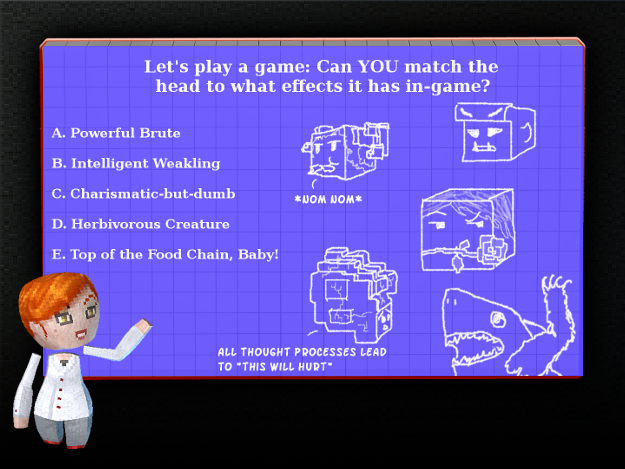This news update, body part discussions come to a head. When building a species, the head piece determines not just the obvious mental and social stats of the species in question, but also their general personality, and how other sentience regard your species.
Heading Out

In terms of stats, heads are most important to all the “mental”, “social” and “magical” attributes, making heads have a major impact upon many types of skills (including crafting and job-related skills), as well as magic and socialization-related skills. Different heads may also affect the relative focus of mind over body, with heads that have weaker mental stats giving a proportional bonus to physical stats, so that you can create “dumb brutes” or “squishy wizards” as a race.
Perhaps even more importantly to the overall simulation, and how your new sentient species relates to the rest of the world, however, heads determine the general “personality types” the species has. Head choices can make a species a “proud warrior race”, with aggressive attitudes and a taste for direct conflict without subterfuge, a “scheming merchant race” that values profits over all, or a “duplicitous race” that sees stealth and subterfuge as a sport in its own right, who see little distinction between “honor” and “gullibility”.
This naturally forms the foundation of diplomacy between different cultures. A culture based upon a strong sense of honor and a proud military tradition is very unlikely to see a culture that sees trickery and deceit as virtues as anything more than a nest of criminals. The talents of diplomats (including player actions) can make a difference, but there will always be a lingering distrust between two cultures of such opposed ideals, even if they must work together for their common survival.
Decisions, Decisions…
To make these “personality types” mean something in actual gameplay, the “decision trees” that NPCs use to choose what activities they perform are also based in large part upon head type. Decision trees in generic NPCs can determine how aggressive or cowardly a character is, or how many hours of work they put in per day.
Because of this, sentients with different head types will have obvious differences in behaviors. While an “ordinary human” culture might have civilians that flee from a fight, a more aggressive society with less of a military/civilian distinction (such as a giant insect hive that expects selfless sacrifice from its worker castes) may have its workers rush invaders like they were the guards to protect colony-critical assets, like the breeders or nurseries.
Similarly, head types on non-sentient creatures can affect their own behaviors. Even if a player doesn’t recognize a new creature, they should be able to tell from looking that a sheep-like herbivore’s head means a probably non-aggressive creature, while a shark’s head full of gnashing teeth is probably a dangerous creature.
In faction leaders, however, heads, and the decision trees they impact, mean different characters will have different leadership styles. Factions with different leadership styles will have different goals. A mayor with a militaristic style may put more effort and resources into weapons manufacturing and training soldiers, while a more capitalistic mayor may focus upon the most profitable industries, and a more populist mayor may focus upon luxury goods or town beautification to try to raise village contentment.
Even within a single species, there is enough variance that replacing one leader with another of the same species can cause a faction to have quite different behavior. However, between different species, the tendencies of given head types to have biases for specific personalities means that head choice will have long-lasting ramification in the way towns are built over the whole history of your species’ cultures.
- The Imagine Nations Team
New Website
We have just launched a new website. We are still working out some of the kinks. We hope to have them resolved shorty so we can give everyone who pledged their backer’s access again. Thank you.

